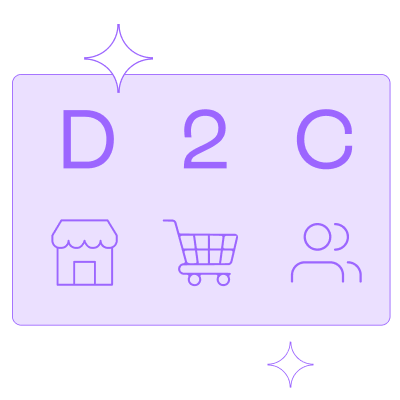Summarize the blog with Artificial Intelligence (AI):

Different business terms that were once only used by those in the known have become commonplace with the advent of e-commerce. The terms such as B2C, B2B, C2C, and C2B have slowly seeped into the internet vocabulary.
It is essential for everyone interested in e-commerce to understand these new terms, abbreviations, and buzzwords, so they can stay on top of the curve and make the correct choices depending on their business decisions. Who knows, maybe one of these newer ideas will define your next business venture.
One term that is slowly getting more popular is D2C. We have prepared this article to explain what D2C means, and what type of business model it is.
Related Article: What is E-Commerce?
What Is D2C Business Model?
The term D2C is simply an abbreviation of Direct to Consumer.
It is a business model like Business to Consumer (B2B) or Business to Business (B2B) and refers to the direction of the transaction that takes place during the business venture.
Direct to Consumer business refers to a company that produces their products in their facilities, markets them themselves, and distributes them with their channels, without relying on a middleman.

Simply put, D2C businesses remove the middleman from the equation. So distribution channels do not need a wholesaler, and production companies do not need a distributor.
The channels a D2C business uses can be anything, such as an e-commerce platform, social media network, retail store, or auction platform. As long as a middleman is not involved during the production to consumer process, the specific sales channel can be considered a D2C channel.
The removal of the resellers, distributors, and producers that usually stand between the brand and the consumer can bring the business closer to its audience.
The Benefits Of D2C Business Model
Like every business model, D2C also comes with its own set of benefits. We will list the most important of them below, so you can make a more informed choice if you ever consider going D2C, or starting a business with a D2C business model.
1. Increased Profits
This one is simple, if you have no middleman, then all the profit will go to you instead of getting divided between your distributors, resellers, wholesalers and etc.
For example, if you are producing a certain product, and selling it only on your website, you will be earning more for every single product sold, as you will be selling at a retail price.
But if you were selling to resellers or distributors, then you will have to sell your products at a wholesale price. This will mean that each product sold will be earning you less money.
Of course, when we say increased profits, we are only talking about a single product sold. Working with distributors and resellers might allow you to sell much more products at a single time.
2. Better Personalization
Having a D2C business model means that you will have more opportunities to directly respond to your customers’ requests and feedback. So you can add the custom elements your customers might require, or you can change and update your product depending on their feedback.
Or you can create a specialized product open for customization. For example, you can make cups or mugs with the design your customers specifically request. As there are no distributors, customers can easily communicate the design they want to the company, and you can produce the mug depending on their request.

3. More Opportunity To Test Your Products
While working with a distributor, you will need to offer them a product they can immediately sell in order to create a business relationship. So your product needs to be fully formed and ready to go.
But with D2C business model, you can create different testing products to determine what type of features or designs work well with the customers. As you have immediate access to their feedback, and you don’t need to make a wholesale, you will be able to determine what type of product works best for your company.
4. Gaining Access To More Consumer Data
When you work with a distributor or a reseller, you won’t be able to access all the data you need about your consumers. You will only have access to what your middleman decides to share with you.
But with D2C, you will have direct access to your consumer data, as you control the main sales channel. As such, it will be easier for you to understand which products perform the best, what type of promotions go well, and what type of behaviours your consumers engage in during their customer journey.

Examples of D2C companies.
1. MVMT
MVMT produces and sells beautiful watches, eyewear, jewellery, and other accessories. Their stylish accessories are durable and unique.
2. Stitch Fix
Stitch Fix uses powerful algorithms and data science in order to offer their customers a personalized curated box of clothes based on budget, fashion choices, size, and style. Their unique position allows them to create a very personalized experience for their customers.
3. Dollar Shave Club
You may recognize Dollar Shave Club from its extensive influencer marketing. The company managed to find success despite the industry giants like Gillette and Shick, thanks to its subscription model. Their authenticity and unique advertising campaigns helped them create their market.
How To Start Your Own D2C Business?
If you are already producing goods and selling them via distributors or resellers, then you can build an e-commerce store to create another sales channel for your business! By having your own e-commerce website, you can start selling directly to your customers.
You don’t need to manufacture products on an industrial scale in order to start a D2C business. Even hand-made items or products customized by you can be enough to call yourself a D2C business.
The main point of a D2C is having control over your product, sales and brand at the same time. As long as you can create that control, and sell your products without relying on a middle man, you can be a D2C business.
Related Articles:
